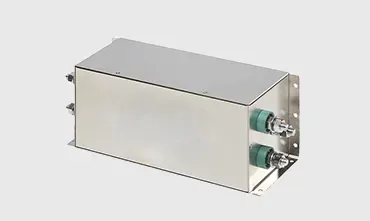A DC Filter is a device used to eliminate unwanted DC components from an AC system (like transformers or motors) or to smooth DC output in rectifiers, inverters, or power converters.
DC Filters
DC Filters – Clean Power. Reliable Performance
At PurityElec, we design and manufacture premium DC filters that ensure stable, interference-free power for sensitive electronics and high-performance systems. Built for precision, our filters eliminate unwanted noise from DC power lines, safeguarding your equipment and enhancing efficiency.

Key Features
• Superior Noise Suppression – Eliminates conducted EMI/RFI for smooth DC power.
• Compact & Durable Build – Space-saving, rugged designs for tough industrial and outdoor environments.
• Wide Operating Range – Supports voltages from 12V to 1000V DC and current ratings from 1A to 200A.
• Low Insertion Loss – Delivers clean power without sacrificing efficiency.
• Quick Installation – Designed for easy wiring and secure mounting.
Applications
• Renewable Energy Systems – Solar inverters, battery storage, wind energy setups
• EV Infrastructure – Electric vehicle charging stations, battery management systems
• Industrial Automation – Motor drives, control systems, robotics
• Telecom & Data Centers – Base stations, networking, backup power
• Railway & Transport – Signaling equipment, onboard electronics
| Technical Specifications | |
|---|---|
| Operating Voltage | 12V–1000V DC |
| Current Ratings | 1A – 200A |
| Insertion Loss | ≥ 60dB (150kHz – 30MHz) |
| Temperature Range | –40°C to +85°C |
| Certifications | RoHS, REACH, CE compliant |
Why PurityElec?
With a commitment to precision engineering and uncompromising quality, PurityElec delivers DC filters that perform in the most demanding applications. Our solutions help you:
✔ Achieve EMC compliance
✔ Extend equipment lifespan
✔ Reduce downtime and maintenance costs
Frequently Asked Questions
-
Q1. What is a DC Filter?
-
Q2. Why is a DC Filter important?
- • Protects equipment from DC-induced overheating
- • Reduces transformer core saturation
- • Prevents harmonic distortions in AC systems
- • Improves the lifespan and efficiency of motors and power electronic devices
-
Q3. Who requires DC Filters?
- • Industries with rectifiers, inverters, or AC-DC converters
- • Power plants with HVDC links
- • Steel, aluminum, and electroplating plants
- • Any system using PWM drives or high-power DC loads
-
Q4. How does a DC Filter work?
- • In AC systems, DC filters use series reactors or chokes to block DC currents while allowing AC to pass.
- • In DC systems, filters use inductors, capacitors, and resistors to smooth DC output and reduce ripple.
-
Q5. What are the common types of DC Filters?
- • Series DC Reactor / Choke: Prevents DC from entering transformers or AC networks.
- • Parallel DC Filter (Smoothing): Reduces ripple in DC bus or output.
- • Hybrid Filters: Combination of active and passive components for high-performance applications.
-
Q6. Can DC filters reduce harmonics?Yes. DC filters reduce low-order harmonics caused by DC injection in AC systems and smooth current in rectifiers, indirectly improving power quality.
-
Q7. Where are DC Filters typically installed?
- • At the output of rectifiers feeding DC motors or drives
- • In HVDC transmission systems
- • In AC systems to prevent DC injection into transformers
- • In renewable energy plants (solar inverters, battery systems)
-
Q8. Are DC Filters suitable for high-power applications?Yes. DC filters are designed for industrial-scale rectifiers and drives, ensuring minimal losses and protecting sensitive equipment.
-
Q9. Do DC filters affect efficiency?Minimal impact. Properly sized DC filters have low series impedance, ensuring high efficiency while protecting equipment and improving power quality.
-
Q10. Which standards govern DC Filter design?
- • IEC 60146 (Rectifiers & Converters)
- • IEEE 519 (Harmonics in AC systems)
- • Manufacturer and utility guidelines for HVDC or industrial DC systems
-
Q11. How do we know if a DC filter is needed?
- • DC current is flowing into AC transformers causing saturation
- • Excessive ripple or voltage fluctuation in DC output
- • Equipment overheating or malfunctioning due to DC injection
- • THD measurements indicate distortion from DC components
-
Q12. What are the key benefits of DC Filters?
- • Protects transformers, motors, and converters
- • Reduces harmonic distortions in AC and DC systems
- • Improves reliability and lifespan of equipment
- • Ensures compliance with power quality standards
-
Q13. What are the limitations of DC Filters?
- • Requires careful sizing for voltage, current, and harmonic frequency
- • May require space and additional maintenance for high-power applications
- • Passive DC filters cannot dynamically adapt to variable loads

